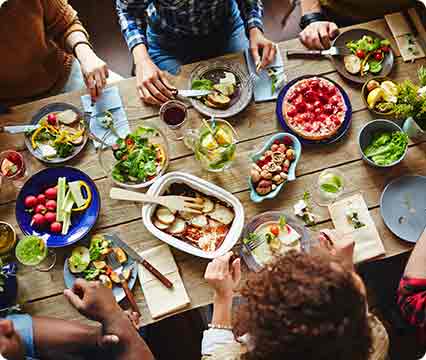Awareness of social influences on eating is dependent on familiarity with imagined dining partners and type of eating occasion
Social settings associated with eating meals appear to influence the amount of food consumed. In other words, eating with strangers raises the odds of consuming less food compared to eating with family and friends, which was found to increase the amount of food consumed. This is known as the social facilitation of eating. Higgs et al. (2022) conducted two studies to evaluate social facilitation and inhibition awareness, where 481 participants in their first study were asked to picture a dining scenario and account for whether they would eat more food, less food, or eat the same amount they’re accustomed to, if they were to eat with someone who they are more familiar or less familiar with, such as a stranger, acquaintance, family member or friend, compared to the amount of food they would eat if they were dining alone. Analysis of the participant responses in study 1 revealed that participants envisioned themselves eating a special meal with family members or friends, with a substantial majority accounting that they would consume less food if they are dining with strangers or acquaintances and that they would consume the same amount of food or eat more food if dining with family or friends. The authors’ second study (485 participants) echoed similar dining perceptions to study 1, however, the latter participants reported their perceptions to include both special and regular meals. The majority of study two’s population reported eating less in special or regular meals if they were dining with strangers, and eating the same amount of food they’re accustomed to if they would be having regular meals with acquaintances. However, if special meals are involved, the participants were equivocal on eating less or eating the same amount of food. Most participants reported that they would eat more food when having a special meal with family or friends, but would eat the same if they were having a regular meal. The authors highlight that the investigated participants are aware of the social facilitation and inhibition behaviors that are involved when having special meals, however, the participants fail to recognize or admit that eating with family or friends causes them to eat more food in comparison to having meals on their own. The authors conclude that enhancing the perception of individuals on this aspect of dietary intake in the company of family or friends can help individuals trying to regulate their consumption of food. [NPID: Awareness, eating, social facilitation, social influences, social inhibition]
Year: 2022
Reference: Impression management and food intake
 Navigation
Navigation






